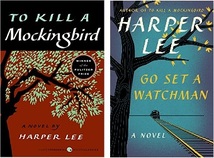
Go Set a Watchman is the purportedly unedited first submitted manuscript version of Harper Lee’s Pulitzer Prize winning novel, To Kill a Mockingbird, and it is a much different book. Three years of back-and-forth editing with Therese von Hohoff Torrey (Tay Hohoff) turned a good idea with important political concepts written by an artful writer, into a novel with characters and a story arc that grab the reader and won’t let go.
The characters in TKAM are stronger and more likable. The story of the little girl, Scout, as told by her older self in TKAM, allows us to see racially charged events with a child’s eye, and to understand them through the seasoning of adult viewpoint. Scout is spunky, sometimes irreverent, but wonderfully sweet. As a reader, I liked her and trusted her to give me an unbiased telling of things as she saw them.
Jean Louise Finch, the grown-up Scout in GSAW, on the other hand, seems more spoiled than spunky. Even when she’s in the right, her arrogant tone of condescension makes her hard to like. I got the feeling she thought she was smarter than everyone except maybe her uncle, and she thought he might be half-mad.
Readers love Atticus in TKAM. He is wise and kind and moral and brave, the sort of hero a young girl would want for a father. He defends an innocent black man even though he knows it’s an unwinnable battle against a formidable army backed by deep-rooted racism.
In GSAW it’s hard to tell what Atticus is really like because all views of him are through the lens of Jean Louise. She adored her father as a child, but now he suddenly appears to be evil incarnate. Toward the end of the book she finally gives him a chance to speak his mind, and he does have reasons for the racist things he’s doing. Whether the reader agrees with his reasons or not, Jean Louise is swayed in a sudden reversal that didn’t ring true for me, and brought the novel to an abrupt and unsatisfying end.
I, like generations of others, love TKAM. My opinion has not changed with the publication of GSAW. It is a stunning novel on many levels, and I still believe Harper Lee to be a brilliant author.
Moreover, I’m incredibly thankful for the opportunity to see behind the scenes just a little bit. I hope that the insights I’ve gleaned will help me to better craft my own stories. And I hope that someday I have the opportunity to work with an editor who catches in my stories just a glimmer of what Hohoff saw in Lee’s manuscript, and will help me make them better.
 RSS Feed
RSS Feed
